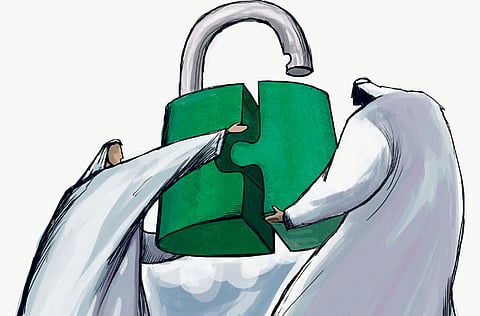GCC security cooperation is the key
The GCC states should stop relying on the US and stand together against regional threats

Three decades after the bloody Iran-Iraq war, two decades after the Iraqi invasion and occupation of Kuwait and with wars in Afghanistan and Iraq still raging, the Gulf Cooperation Council (GCC) states are still searching for an effective strategy to stave off the host of challenges and crises that continue to haunt the region and its peoples.
The Al Houthi insurgency in Yemen has added a new dimension to Gulf security. For the first time since Iraq occupied Kuwait in 1990, a GCC state (Saudi Arabia) finds itself fighting insurgents on its border.
In its nearly 30 years of existence, the GCC has failed to forge a unified alliance and Gulf security remains elusive and fragile. There is a desperate need for a new Gulf security architecture that is not US centric. India and China loom as alternative partners.
During the height of the Cold War, the GCC states found themselves in the midst of much tumult and regional crisis. Neither the Nixon nor the Carter doctrines were sufficient to safeguard the region and instill much-needed stability in this extremely vital and strategic region. Events such as the Iranian Revolution, the Soviet occupation of Afghanistan, the occupation of the Sacred Mosque in Makkah and the assassination of Egyptian president Anwar Sadat propelled the United Arab Emirates, Bahrain, Oman, Qatar, Kuwait and Saudi Arabia to form the GCC in 1981.
The precarious situation in the Gulf region took a turn for the worse in the 1990s and during the first decade of the 21st century. The real problems began as a result of Saddam Hussain's wanton aggression and occupation of Kuwait, the subsequent war to liberate Kuwait and the imposition of heavy sanctions against Iraq. That pushed the region into a new alignment, changed the security matrix and resulted in a permanent US military presence in the region. The Clinton Doctrine of containment of both Iraq and Iran and the signing of security pacts with the GCC states followed.
Weakening Iraq and imposing a new balance of power dominated by the US benefited Iran, which became the de facto hegemon of the Gulf region. Sidelining the two leading regional heavyweights Iraq and Iran is not a lasting formula for security and stability. The GCC states are overly reliant on the US and its Western allies for security, and Arabs and Asians play a very small roll.
The GCC states have failed to form their own deterrent force, leaving themselves vulnerable and threatening the energy security and prosperity of the world. This is a problem in particular for Asia, which imports close to 70 per cent of its oil from the Gulf region. That percentage will only increase as time goes by.
There is an urgent need for the GCC states to forge a strong security architecture to safeguard their wellbeing in this tumultuous and tough neighbourhood. At the last GCC summit in Kuwait, the members declared their solidarity with Saudi Arabia, the largest GCC member, in its conflict with the Al Houthi rebels. There was also discussion of creating a GCC rapid deployment force to tackle security threats. This is a step in the right direction, but it still leaves a lot to be desired.
It is high time for the GCC leadership to come up with a more unified strategic approach to rescue Yemen from the mayhem that threatens to transform it into a failed state. Such an outcome would have catastrophic repercussions for Gulf security. It is chilling that a man trained by Al Qaida in Yemen was almost successful in blowing up an aircraft over Detroit on Christmas Eve. That was a wake-up call for all concerned, including the US and the West.
The GCC's reaction to the situation in Yemen is a litmus test that should indicate the council's ability to cooperate on matters of security as the second decade of the 21st century dawns.
Dr Abdullah Alshayji is a professor of political science at Kuwait University.



